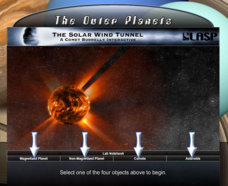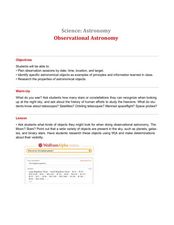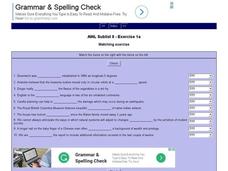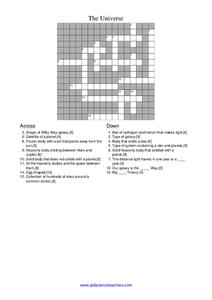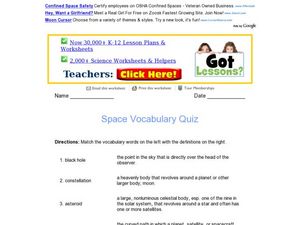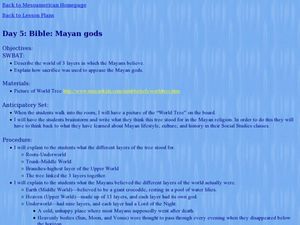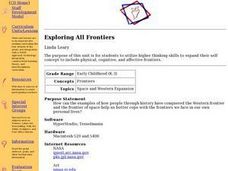Curated OER
Discovering Conic Sections in the Motion of Heavenly Bodies
Math scholars study conics and how they are used today. In this mathematical lesson plan, pupils construct and slice cones after viewing a demonstration.
Laboratory for Atmospheric and Space Physics
The Solar Wind Tunnel
The winds of change are blowing in our very own solar system! But what makes some heavenly bodies more affected by solar winds than others? Pupils discover the concept of magnetic forces at work in space in this...
PBS
The Planets of the Solar System
Launch a lesson that's sure to capture middle schoolers' interest! Exploration enthusiasts examine the planets of our solar system using an activity from PBS's Space series. The resource includes images and information for each planet,...
Curated OER
Earth's Heavenly Treasures: Hummingbirds
Young ornithologists watch an informative video and use the Internet to gather data about the life, size, habitat, and migration of hummingbirds. The interdisciplinary lesson includes activities that target art, science, math, and...
Curated OER
After We Die: Personal Search
In this religious discussion learning exercise, students are asked to discuss their thoughts about Bible passages dealing with heaven and judgment. Students discuss ten questions.
Curated OER
Starquest
Students study the history and cultural interpretation of a celestial body or constellation. They create technology based presentations of the information.
Curated OER
What's Up?
Students compare and contrast the various heavenly bodies found in the sky at night. They identify the moon and stars in the sky as well as how the stars form pictures called constellations. Students also experiment with reflection and...
Curated OER
Being Nosy About Our Neighbors
Students use the scientific method to explore the effect of size on impact cratering. They compare images of landforms on Earth to those of other planets to compare surface processes. Students infer the geologic history of another...
Curated OER
Retrograde Motion
Students study the motions of the heavenly bodies. In this space instructional activity students use models to show a variety of schemes explaining the motions.
Curated OER
Observational Astronomy
Students research about the characteristics of celestial bodies using a database. In this space science lesson, students collect data such as brightness, apparent color and size by observing the night sky. They share their findings with...
Curated OER
Nathaniel Hawthorne: "Young Goodman Brown"
Give your class some background information on both Nathaniel Hawthorne and his short story "Young Goodman Brown." Basic themes and characters are introduced, especially as this is an allegory with many symbolic elements. Help your...
One Pot Learning
Reading Comprehension Worksheet
Three annotated passages from Ralph Waldo Emerson's essay on "Nature" provide young philosophers a chance to improve their reading comprehension skills as they gain insight into Emerson's ideas.
American Museum of Natural History
What Do You Know About Astronomy
Develop an understanding of the universe. Learners answer 10 multiple choice questions about several topics in astronomy. Questions contain information about the age of the universe, gravitational attraction, galaxies, planets and comets...
Curated OER
Theories
Young scholars view a series of videos that explore the development, formation and arguments for the geocentric model of the solar system. Studenst investigate the heliocentric model of the solar system and consider how scientific...
Curated OER
Our Sun
In this space science worksheet, students use the clues at the bottom of the sheet to solve the crossword puzzle on our sun. They identify the cooler and visible surface areas of the sun, as well as what sunspots are on the sun.
Curated OER
English Vocabulary Skills: AWL Sublist 8 - Exercise 1a
In this online interactive English vocabulary skills worksheet, students answer 10 matching questions which require them to fill in the blanks in 10 sentences. Students may submit their answers to be scored.
Curated OER
The Universe
In this space science activity, students use the clues given at the bottom of the sheet to complete the crossword puzzle relating to the universe. There are 16 clues to solve in the puzzle.
Curated OER
Lost in Uruguay
This quiz on the culture and geography of Uruguay may serve best as a sponge activity for those who have finished an assignment. Questions are multiple-choice, and each correct answer is worth 15 points. Quiz-takers must earn 1000 points...
Laboratory for Atmospheric and Space Physics
Orbit Simulator
Researchers think they have evidence of a new planet deep in our solar system that is the size of Neptune and orbits the sun far beyond Pluto. The orbit simulator shows the orbits of our well-known planets, as well as Pluto and the comet...
Describing Egypt
Ramesses VI - (20th Dynasty)
An interactive tour of the tomb of Rameses VI illustrates ancient Egypt's explanation of life with its intricate drawings and details. Dragging the mouse shows a 365-degree view of the tomb, and details about the meaning of each location...
Curated OER
Space Vocabulary Quiz
In this space vocabulary learning exercise, students draw lines to match 14 vocabulary words pertaining to space with their definitions.
Curated OER
Bible: Mayan Gods
Students discover beliefs and practices of the Mayans. In this Mayan gods lesson, students discuss "The World Tree" of the Mayans, the three layers of the tree, and their meanings. Students discover the manner and purpose of...
Curated OER
What's Out There? Space Shuttle Exploration and Simulation
Students role-play the jobs of space shuttle astronauts, conduct experiments, and research space using the Internet and offline experiments. Student-astronauts hold a "press conference" to share their information with others in a...
Curated OER
Exploring All Frontiers
Students utilize higher thinking skills to expand their self concept to include physical, cognitive, and affective frontiers. The teacher create activities which allow students to use raw data and primary sources, as well as...



